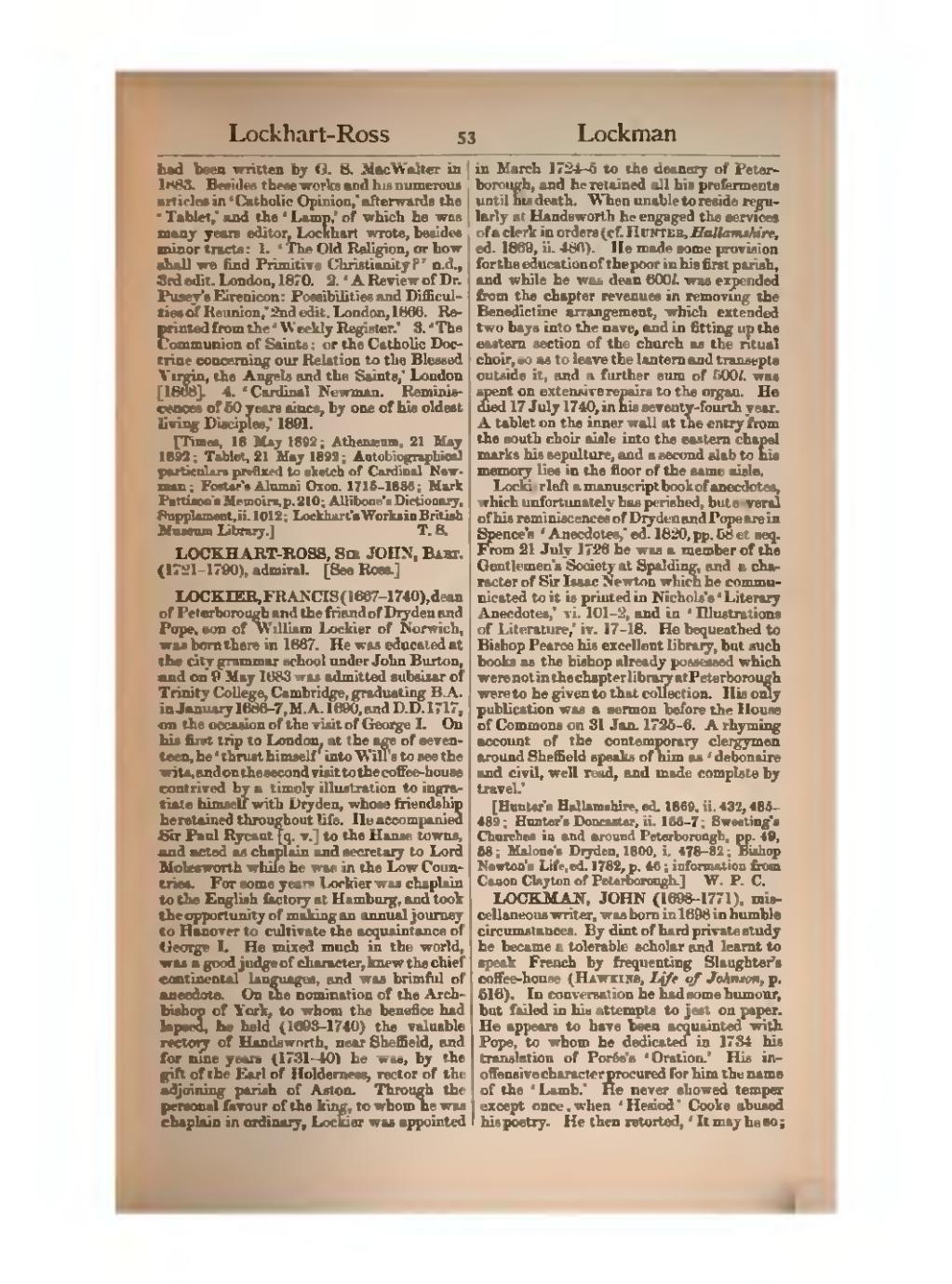had been written by G. S. MacWalter in 1883. Besides these works and his numerous articles in ‘Catholic Opinion,’ afterwards the ‘Tablet,’ and the ‘Lamp,’ of which he was many years editor, Lockhart wrote, besides minor tracts:
- ‘The Old Religion, or how shall we find Primitive Christianity?’ n.d., 3rd edit. London, 1870.
- ‘A Review of Dr. Pusey's Eirenicon: Possibilities and Difficulties of Reunion,’ 2nd edit. London, 1866. Reprinted from the ‘Weekly Register.’
- ‘The Communion of Saints; or the Catholic Doctrine concerning our Relation to the Blessed Virgin, the Angels and the Saints,’ London [1868].
- ‘Cardinal Newman. Reminiscences of 50 years since, by one of his oldest living Disciples,’ 1891. (The substance of this appeared in the ‘Paternoster Review,’ No. 1, Oct. 1890.)
[Times, 18 May 1892; Athenæum, 21 May 1892; Tablet, 21 May 1892; Autobiographical particulars prefixed to sketch of Cardinal Newman; Foster's Alumni Oxon. 1715–1886; Mark Pattison's Memoirs, p. 210; Lockhart's Works.]
LOCKHART-ROSS, Sir JOHN, Bart. (1721–1790), admiral. [See Ross.]
LOCKIER, FRANCIS (1667–1740), dean of Peterborough and the friend of Dryden and Pope, son of William Lockier of Norwich, was born there in 1667. He was educated at the city grammar school under John Burton, and on 9 May 1683 was admitted subsizar of Trinity College, Cambridge, graduating B.A. in January 1686–7, M.A. 1690, and D.D. 1717, on the occasion of the visit of George I. On his first trip to London, at the age of seventeen, he ‘thrust himself’ into Will's to see the wits, and on the second visit to the coffee-house contrived by a timely illustration to ingratiate himself with Dryden, whose friendship he retained throughout life. He accompanied Sir Paul Rycaut [q. v.] to the Hanse towns, and acted as chaplain and secretary to Lord Molesworth while he was in the Low Countries. For some years Lockier was chaplain to the English factory at Hamburg, and took the opportunity of making an annual journey to Hanover to cultivate the acquaintance of George I. He mixed much in the world, was a good judge of character, knew the chief continental languages, and was brimful of anecdote. On the nomination of the Archbishop of York, to whom the benefice had lapsed, he held (1693–1740) the valuable rectory of Handsworth, near Sheffield, and for nine years (1731–40) he was, by the gift of the Earl of Holderness, rector of the adjoining parish of Aston. Through the personal favour of the king, to whom he was chaplain in ordinary, Lockier was appointed in March 1724–5 to the deanery of Peterborough, and he retained all his preferments until his death. When unable to reside regularly at Handsworth he engaged the services of a clerk in orders (cf. Hunter, Hallamshire, ed. 1869, ii. 486). He made some provision for the education of the poor in his first parish, and while he was dean 600l. was expended from the chapter revenues in removing the Benedictine arrangement, which extended two bays into the nave, and in fitting up the eastern section of the church as the ritual choir, so as to leave the lantern and transepts outside it, and a further sum of 500l. was spent on extensive repairs to the organ. He died 17 July 1740, in his seventy-fourth year. A tablet on the inner wall at the entry from the south choir aisle into the eastern chapel marks his sepulture, and a second slab to his memory lies in the floor of the same aisle.
Lockier left a manuscript book of anecdotes, which unfortunately has perished, but several of his reminiscences of Dryden and Pope are in Spence's ‘Anecdotes,’ ed. 1820, pp. 58 et seq. From 21 July 1726 he was a member of the Gentlemen's Society at Spalding, and a character of Sir Isaac Newton which he communicated to it is printed in Nichols's ‘Literary Anecdotes,’ vi. 101–2, and in ‘Illustrations of Literature,’ iv. 17–18. He bequeathed to Bishop Pearce his excellent library, but such books as the bishop already possessed which were not in the chapter library at Peterborough were to be given to that collection. His only publication was a sermon before the House of Commons on 31 Jan. 1725–6. A rhyming account of the contemporary clergymen around Sheffield speaks of him as ‘debonaire and civil, well read, and made complete by travel.’
[Hunter's Hallamshire, ed. 1869, ii. 432, 485–489; Hunter's Doncaster, ii. 166–7; Sweeting's Churches in and around Peterborough, pp. 49, 58; Malone's Dryden, 1800, i. 478–82; Bishop Newton's Life, ed. 1782, p. 46; information from Canon Clayton of Peterborough.]
LOCKMAN, JOHN (1698–1771), miscellaneous writer, was born in 1698 in humble circumstances. By dint of hard private study he became a tolerable scholar and learnt to speak French by frequenting Slaughter's coffee-house (Hawkins, Life of Johnson, p. 516). In conversation he had some humour, but failed in his attempts to jest on paper. He appears to have been acquainted with Pope, to whom he dedicated in 1734 his translation of Porée's ‘Oration.’ His inoffensive character procured for him the name of the ‘Lamb.’ He never showed temper except once, when ‘Hesiod’ Cooke abused his poetry. He then retorted, ‘It may be so;
